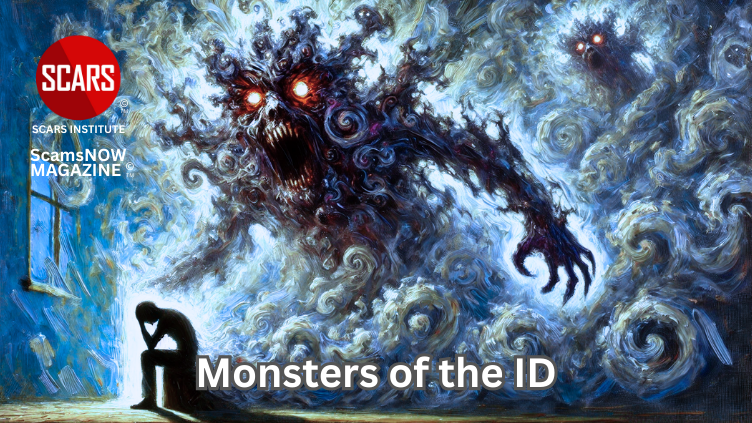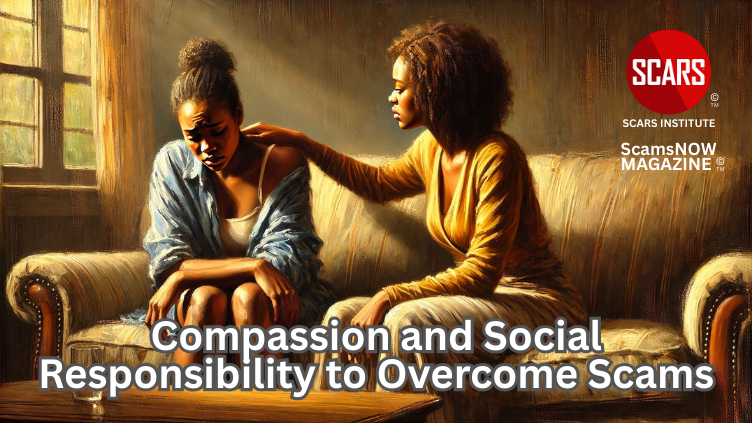From Pain to Empowerment: Using Compassion and Social Responsibility to Overcome Scams
Compassion and Social Responsibility: Helping Yourself and Others Recover from Scams
Primary Category: Scam Victim Recovery Psychology
Intended Audience: Scam Victims-Survivors / Family & Friends
Author:
• Tim McGuinness, Ph.D., DFin, MCPO, MAnth – Anthropologist, Scientist, Polymath, Director of the Society of Citizens Against Relationship Scams Inc.
About This Article
Scam victims often face overwhelming emotions of shame, anger, and isolation, making recovery a difficult process. Jean-Jacques Rousseau’s philosophy of compassion and social responsibility offers a path forward, emphasizing the need for self-kindness and collective support. Victims must first practice self-compassion by letting go of self-blame, prioritizing emotional healing, and taking constructive action to rebuild their lives. Beyond personal recovery, they also have a responsibility to help others by sharing knowledge, providing emotional support, and encouraging responsible decision-making.
Ethical advocacy is crucial—victims must avoid public shaming, revenge-driven actions, or further emotional harm to themselves and others. Instead, responsible efforts should focus on education, scam prevention, and structured support systems. By applying both compassion and social responsibility, scam victims can turn their experiences into empowerment, fostering healing for themselves and strengthening the broader fight against fraud.

Compassion and Social Responsibility: Helping Yourself and Others Recover from Scams
Scam victims often feel isolated, overwhelmed, and betrayed. The financial and emotional toll of fraud can be devastating, leaving victims struggling to process their experiences and rebuild their lives. However, recovery is not just about individual healing—it is also about recognizing the power of compassion and social responsibility in the aftermath of deception.
Jean-Jacques Rousseau, an influential Enlightenment philosopher, believed that humans are naturally compassionate and that society should nurture this quality to create a just and supportive world. He argued that individuals have a responsibility to care for others, particularly the vulnerable. In the context of scam recovery, this philosophy highlights an essential truth: helping oneself and assisting others are interconnected. By applying compassion to personal healing and extending support to fellow victims, scam survivors can foster resilience, regain control, and contribute to a community of empowerment rather than despair.
This article explores how scam victims can use compassion and social responsibility to aid their recovery while also helping others who have suffered similar experiences. It will outline practical steps for self-compassion, discuss how victims can responsibly support one another, and emphasize the importance of ethical advocacy within scam victim communities.
Self-Compassion: The Foundation of Recovery
Before scam victims can effectively help others, they must first address their own healing process. Too often, victims engage in self-blame, shame, and anger—emotions that hinder recovery rather than support it. Rousseau’s philosophy of compassion suggests that instead of punishing ourselves for being deceived, we must treat ourselves with the same kindness we would offer a friend in distress.
Letting Go of Self-Blame
Many scam victims replay the events leading up to the fraud, convinced they should have seen the warning signs. Thoughts like “I should have been smarter” or “How could I be so naïve?” create a cycle of guilt that prolongs suffering. However, compassion means acknowledging that scams are designed to deceive—even intelligent, experienced individuals fall victim. Instead of berating themselves, victims should recognize that they were targeted by professional manipulators, not because of a personal failing but because scams are built to exploit trust and human nature.
Prioritizing Mental and Emotional Healing
Recovering from a scam is not just about regaining lost money—it is about restoring emotional stability. Victims must allow themselves time to grieve, process their emotions, and work through the trauma. Self-care practices such as journaling, therapy, meditation, or talking with a trusted friend can help ease emotional burdens. Compassion means giving oneself the grace to heal rather than demanding immediate resilience.
Taking Constructive Action
Part of practicing self-compassion is taking steps toward recovery, rather than dwelling on past mistakes. Victims can regain a sense of control by reporting the scam, securing their finances, and educating themselves about fraud prevention. These actions reinforce the idea that while the scam may have caused harm, it does not have to define the victim’s future.
Helping Others: The Social Responsibility of Scam Victims
While self-compassion is necessary for personal healing, scam victims also have a social responsibility to support others who are suffering. Rousseau emphasized that individuals should care for the vulnerable, and few are as vulnerable as scam victims who are newly realizing their loss. By extending empathy and guidance to others, victims can transform their experiences into something meaningful, fostering a community of strength rather than one of helplessness.
Sharing Knowledge and Experiences
One of the most powerful ways scam victims can assist others is by sharing their experiences. Many victims remain silent due to shame, allowing scammers to continue deceiving others. By speaking out—whether through personal conversations, online forums, or victim advocacy groups—survivors can educate others on scam tactics, warning signs, and recovery strategies.
However, it is important to approach this responsibly. Some victims may not be ready to discuss their experiences, and pressuring them to do so can be counterproductive. Instead, offering a safe space where people can share at their own pace fosters trust and community support.
Providing Emotional Support Without Judgment
Newly scammed victims often experience intense emotions—shock, anger, humiliation, and despair. Those who have already gone through the recovery process can play a crucial role in offering comfort and reassurance. Simply telling another victim, “I understand what you’re going through, and you’re not alone,” can be incredibly powerful.
That said, it is important to provide support without imposing personal beliefs or pushing for specific actions. Each victim processes their situation differently, and compassion requires patience. Some may be ready to take action immediately, while others need more time to come to terms with what happened. Respecting their emotional journey is key to ethical support.
Encouraging Responsible Decision-Making
Many scam victims, in their desperation to fix the situation, become vulnerable to additional scams—especially those promising to recover lost funds. Those who have already navigated recovery can help others avoid these pitfalls by warning them about recovery scams, illegitimate legal services, and financial risks such as taking out loans or gambling to recoup losses.
Encouragement should be constructive rather than fear-driven. Instead of saying, “You’re making a terrible mistake,” a more effective approach is, “I understand why you’re considering this, but here’s why I would be cautious.” This allows victims to make informed choices while feeling supported rather than criticized.
Ethical Advocacy: Compassion Without Exploitation
While helping others is a noble endeavor, scam victims must be careful to engage in ethical advocacy rather than emotional venting or misguided activism. Advocacy should be focused on education, protection, and policy improvement—not on vengeance, public shaming, or personal validation.
Avoiding Witch Hunts and Public Exposures
Many victims feel a strong desire for justice, sometimes leading them to publicly expose suspected scammers on social media. While it is understandable to want accountability, online vigilantism can have unintended consequences, including legal risks and potential retaliation. Compassionate advocacy focuses on legal channels, such as reporting scams to law enforcement, consumer protection agencies, and advocacy groups, rather than engaging in personal attacks.
Supporting Scam Prevention Efforts
Scam victims who want to turn their experiences into meaningful action can participate in fraud prevention initiatives. This could include volunteering for scam awareness campaigns, supporting legislative efforts for stronger consumer protections, or contributing to online communities dedicated to fraud education. Responsible advocacy ensures that efforts to combat scams are constructive and beneficial rather than reactionary.
Setting Healthy Boundaries
While helping others is important, scam victims must also be mindful of their own well-being. Some survivors, in their desire to assist, take on too much emotional burden, reliving their own trauma through others. It is essential to set limits—offering support without becoming overwhelmed. This might mean referring victims to professional resources when needed or stepping back if involvement begins to negatively impact personal recovery.
Conclusion: A Cycle of Healing Through Compassion
Rousseau’s philosophy of compassion and social responsibility provides an important framework for scam victims navigating recovery. Self-compassion is the foundation—helping victims heal without self-blame or unnecessary suffering. Social responsibility extends that healing outward, allowing survivors to support others in a way that fosters resilience, awareness, and community strength.
By applying these principles, scam victims can reclaim control of their lives while also ensuring that others have the support they need to recover. Compassion, when practiced both internally and externally, transforms pain into empowerment, creating a cycle of healing that benefits individuals and society as a whole.
-/ 30 /-
What do you think about this?
Please share your thoughts in a comment below!
Statement About Victim Blaming
SCARS Institute articles examine different aspects of the scam victim experience, as well as those who may have been secondary victims. This work focuses on understanding victimization through the science of victimology, including common psychological and behavioral responses. The purpose is to help victims and survivors understand why these crimes occurred, reduce shame and self-blame, strengthen recovery programs and victim opportunities, and lower the risk of future victimization.
At times, these discussions may sound uncomfortable, overwhelming, or may be mistaken for blame. They are not. Scam victims are never blamed. Our goal is to explain the mechanisms of deception and the human responses that scammers exploit, and the processes that occur after the scam ends, so victims can better understand what happened to them and why it felt convincing at the time, and what the path looks like going forward.
Articles that address the psychology, neurology, physiology, and other characteristics of scams and the victim experience recognize that all people share cognitive and emotional traits that can be manipulated under the right conditions. These characteristics are not flaws. They are normal human functions that criminals deliberately exploit. Victims typically have little awareness of these mechanisms while a scam is unfolding and a very limited ability to control them. Awareness often comes only after the harm has occurred.
By explaining these processes, these articles help victims make sense of their experiences, understand common post-scam reactions, and identify ways to protect themselves moving forward. This knowledge supports recovery by replacing confusion and self-blame with clarity, context, and self-compassion.
Additional educational material on these topics is available at ScamPsychology.org – ScamsNOW.com and other SCARS Institute websites.
-/ 30 /-
What do you think about this?
Please share your thoughts in a comment below!
TABLE OF CONTENTS
- Compassion and Social Responsibility: Helping Yourself and Others Recover from Scams
- About This Article
- Compassion and Social Responsibility: Helping Yourself and Others Recover from Scams
- Self-Compassion: The Foundation of Recovery
- Helping Others: The Social Responsibility of Scam Victims
- Ethical Advocacy: Compassion Without Exploitation
- Conclusion: A Cycle of Healing Through Compassion
CATEGORIES
![NavyLogo@4x-81[1] From Pain to Empowerment: Using Compassion and Social Responsibility to Overcome Scams - 2025](https://scamsnow.com/wp-content/uploads/2025/04/NavyLogo@4x-811.png)
ARTICLE META
Important Information for New Scam Victims
- Please visit www.ScamVictimsSupport.org – a SCARS Website for New Scam Victims & Sextortion Victims.
- SCARS Institute now offers its free, safe, and private Scam Survivor’s Support Community at www.SCARScommunity.org – this is not on a social media platform, it is our own safe & secure platform created by the SCARS Institute especially for scam victims & survivors.
- SCARS Institute now offers a free recovery learning program at www.SCARSeducation.org.
- Please visit www.ScamPsychology.org – to more fully understand the psychological concepts involved in scams and scam victim recovery.
If you are looking for local trauma counselors, please visit counseling.AgainstScams.org
If you need to speak with someone now, you can dial 988 or find phone numbers for crisis hotlines all around the world here: www.opencounseling.com/suicide-hotlines
Statement About Victim Blaming
Some of our articles discuss various aspects of victims. This is both about better understanding victims (the science of victimology) and their behaviors and psychology. This helps us to educate victims/survivors about why these crimes happened and not to blame themselves, better develop recovery programs, and help victims avoid scams in the future. At times, this may sound like blaming the victim, but it does not blame scam victims; we are simply explaining the hows and whys of the experience victims have.
These articles, about the Psychology of Scams or Victim Psychology – meaning that all humans have psychological or cognitive characteristics in common that can either be exploited or work against us – help us all to understand the unique challenges victims face before, during, and after scams, fraud, or cybercrimes. These sometimes talk about some of the vulnerabilities the scammers exploit. Victims rarely have control of them or are even aware of them, until something like a scam happens, and then they can learn how their mind works and how to overcome these mechanisms.
Articles like these help victims and others understand these processes and how to help prevent them from being exploited again or to help them recover more easily by understanding their post-scam behaviors. Learn more about the Psychology of Scams at www.ScamPsychology.org
SCARS INSTITUTE RESOURCES:
If You Have Been Victimized By A Scam Or Cybercrime
♦ If you are a victim of scams, go to www.ScamVictimsSupport.org for real knowledge and help
♦ SCARS Institute now offers its free, safe, and private Scam Survivor’s Support Community at www.SCARScommunity.org/register – this is not on a social media platform, it is our own safe & secure platform created by the SCARS Institute especially for scam victims & survivors.
♦ Enroll in SCARS Scam Survivor’s School now at www.SCARSeducation.org
♦ To report criminals, visit https://reporting.AgainstScams.org – we will NEVER give your data to money recovery companies like some do!
♦ Follow us and find our podcasts, webinars, and helpful videos on YouTube: https://www.youtube.com/@RomancescamsNowcom
♦ Learn about the Psychology of Scams at www.ScamPsychology.org
♦ Dig deeper into the reality of scams, fraud, and cybercrime at www.ScamsNOW.com and www.RomanceScamsNOW.com
♦ Scam Survivor’s Stories: www.ScamSurvivorStories.org
♦ For Scam Victim Advocates visit www.ScamVictimsAdvocates.org
♦ See more scammer photos on www.ScammerPhotos.com
You can also find the SCARS Institute’s knowledge and information on Facebook, Instagram, X, LinkedIn, and TruthSocial
Psychology Disclaimer:
All articles about psychology and the human brain on this website are for information & education only
The information provided in this and other SCARS articles are intended for educational and self-help purposes only and should not be construed as a substitute for professional therapy or counseling.
Note about Mindfulness: Mindfulness practices have the potential to create psychological distress for some individuals. Please consult a mental health professional or experienced meditation instructor for guidance should you encounter difficulties.
While any self-help techniques outlined herein may be beneficial for scam victims seeking to recover from their experience and move towards recovery, it is important to consult with a qualified mental health professional before initiating any course of action. Each individual’s experience and needs are unique, and what works for one person may not be suitable for another.
Additionally, any approach may not be appropriate for individuals with certain pre-existing mental health conditions or trauma histories. It is advisable to seek guidance from a licensed therapist or counselor who can provide personalized support, guidance, and treatment tailored to your specific needs.
If you are experiencing significant distress or emotional difficulties related to a scam or other traumatic event, please consult your doctor or mental health provider for appropriate care and support.
Also read our SCARS Institute Statement about Professional Care for Scam Victims – click here
If you are in crisis, feeling desperate, or in despair, please call 988 or your local crisis hotline – international numbers here.
More ScamsNOW.com Articles
A Question of Trust
At the SCARS Institute, we invite you to do your own research on the topics we speak about and publish. Our team investigates the subject being discussed, especially when it comes to understanding the scam victims-survivors’ experience. You can do Google searches, but in many cases, you will have to wade through scientific papers and studies. However, remember that biases and perspectives matter and influence the outcome. Regardless, we encourage you to explore these topics as thoroughly as you can for your own awareness.

























![scars-institute[1] From Pain to Empowerment: Using Compassion and Social Responsibility to Overcome Scams - 2025](https://scamsnow.com/wp-content/uploads/2025/04/scars-institute1.png)

![niprc1.png1_-150×1501-1[1] From Pain to Empowerment: Using Compassion and Social Responsibility to Overcome Scams - 2025](https://scamsnow.com/wp-content/uploads/2025/04/niprc1.png1_-150x1501-11.webp)